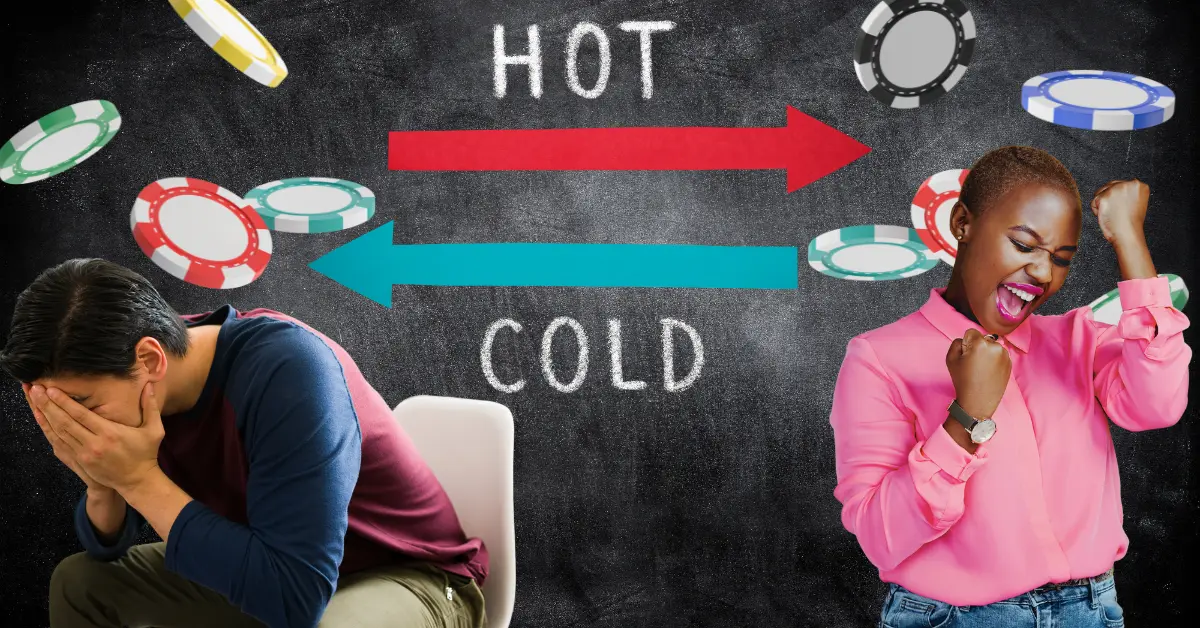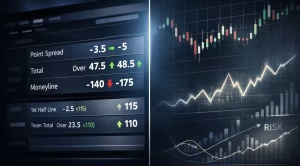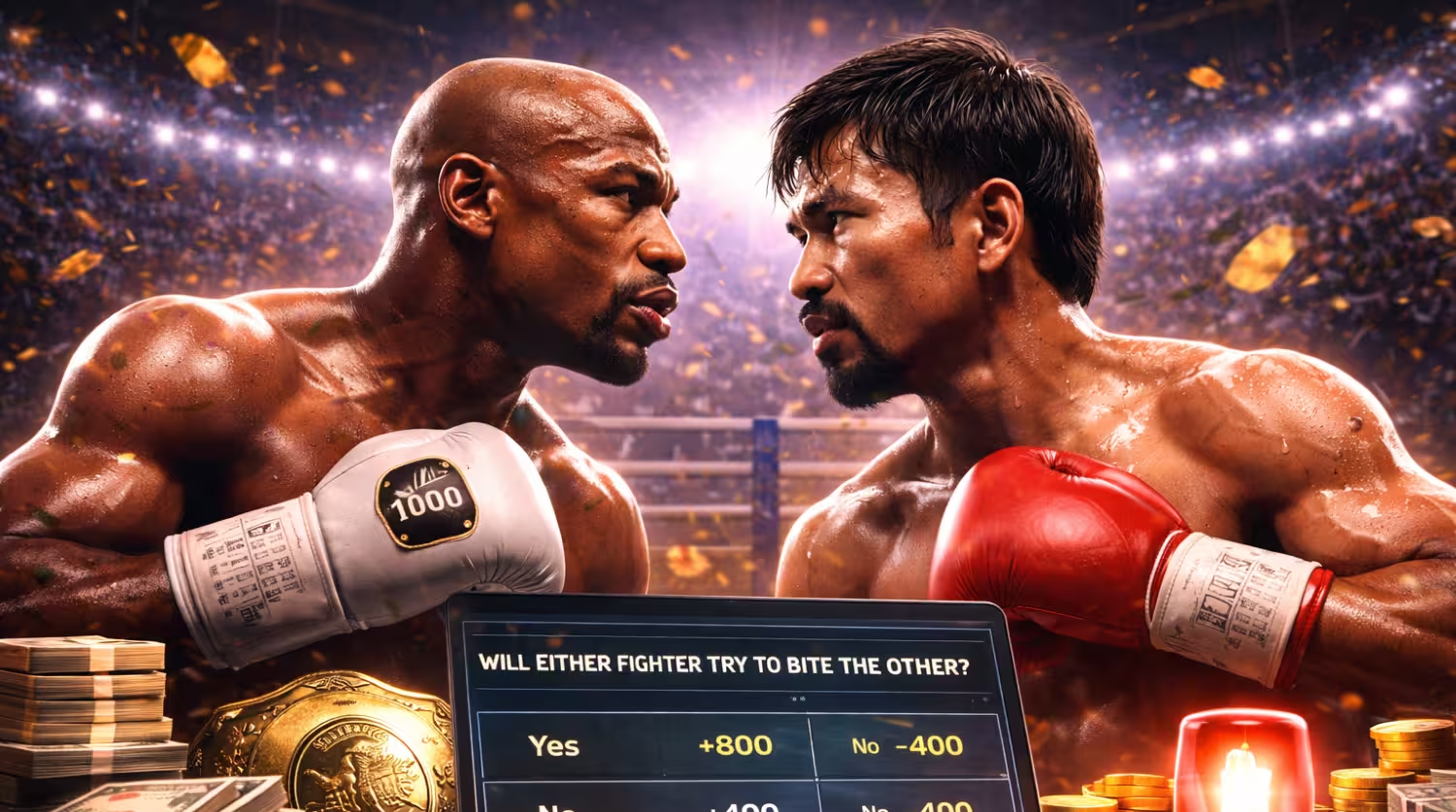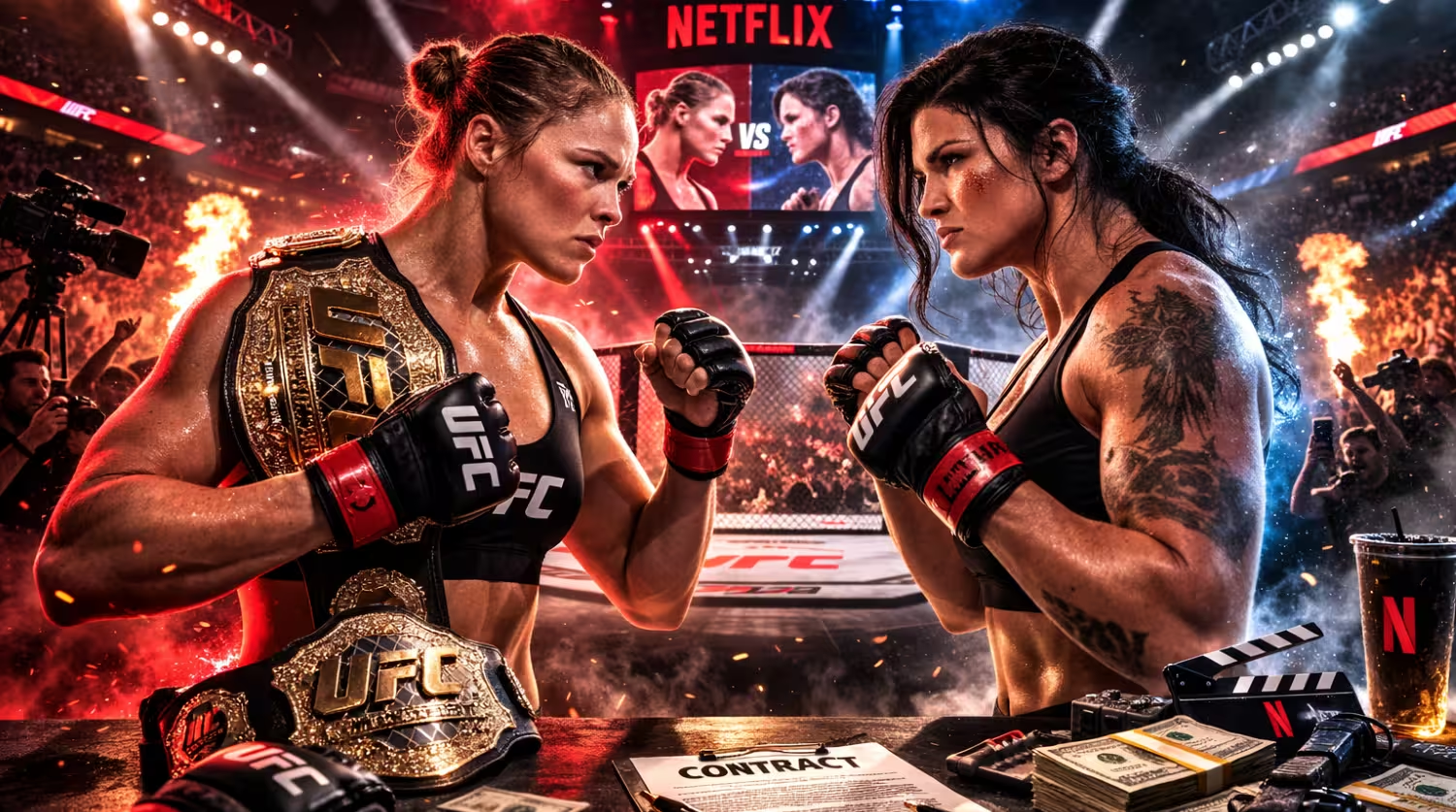The Truth About Hot and Cold Streaks in Online Gambling

There are gamblers who will swear on their mom’s lives that they can feel it in their bones the cards are “hot,” the reels are “locked in,” or they’re “in the zone.” Then there are the less optimistic players who will walk away from a game because it went cold and nothing went their way. We’re talking about streakers (no, not that kind). Gambling streaks and the people who believe in them! They’re built into the way some people talk about gambling, especially online. Are they real, or are they fairytales that gamblers tell themselves, win or lose?
Luck is luck, and it changes in an instant. You can win six straight blackjack hands and feel like you’ve cracked the code. You go nine sports bets without a single win and wonder if the universe is plotting against you. The streaks feel very real because your gray matter is designed to make sense of patterns, even if the numbers in no way back it up.
Listen up, all of you streak believers: We are gonna give it to you straight, and it’ll hurt at first, about hot and cold streaks, what’s happening psychologically, what the odds say about them, when there is a little edge, and how chasing streaks can demolish your bankroll. We’ll also throw in some IRL examples of people who fell into the trap, just in case you don’t believe us.
What Gamblers Mean by ‘Hot’ and ‘Cold’ Streaks
In gambling lingo, calling something “hot” or “cold” has nothing to do with the temperature; it’s referring to how the money’s moving. A “hot streak” means that you’re hitting wins back-to-back. Your balance is climbing, your bets are landing, and you start to believe that you’ve got momentum. A “cold streak” is the opposite, where you can’t win to save your life.
Gamblers throw these terms around willy-nilly, particularly in blackjack, slots, and sports betting:
- With slots, players talk about “machines going dead” or being “ice cold” when they haven’t seen a bonus or decent payout in dozens of spins. Then they’ll describe “hitting a heater” if the machine drops free spins or big line wins multiple times in a short session.
- In blackjack, a “hot deck” is when the cards seem to fall perfectly. The dealer busts, you’re pulling 20s, and the doubles are paying off. If the table goes sour, players talk about “cold shoes” or complain that “the cards dried up.”
- Sports bettors say things like “I’m running hot” if they’ve hit several parlays or spread bets in a row. Losing three or four picks? “I’m in a cold slump,” they’ll say, blaming a bad beat or a last-second field goal.
The expressions pop up constantly in Reddit threads, gambling Discords, and Twitch streams. One player said, “I went on a 7-day hot streak where I couldn’t lose on blackjack. Made $2k. Then BAM! The coldest three days of my life. Lost every hand, and it felt like the dealer was cheating.”
There are gambling advice posts that talk about “finding a hot machine” or “knowing when to walk away from a cold table,” even though that implies that the odds have somehow changed, which is something the math doesn’t exactly support. But the belief? It’s pretty much unshakeable to the believers.
The Psychology Behind the Streak Belief
Gamblers talk about luck changing ad nauseum, but 99% of the time, it’s their brains playing tricks on them. There are three mainstay psychological patterns that fuel the whole “streak” mindset, and they’re the culprits for some of the most expensive mistakes in online gambling.
The Gambler’s Fallacy

Let’s start out with the Gambler’s Fallacy. This is the belief that if you’ve had a string of losses, a win is somehow “due.” It’s super common in roulette. If black hits eight times in a row, players will start piling their money on red, with the thinking that it has to show up soon. But each spin is independent. It doesn’t matter what happened before. The wheel doesn’t “owe” you anything. A Reddit user broke this down in agonizing detail: He chased red after a long black run, doubled down after every miss, and ended up losing everything. Then, when he finally switched to black out of frustration and panic, red hit. The fallacy cost him his entire session.
The Hot Hand Fallacy

And then you’ve got the Hot Hand Fallacy. That’s the idea that once you start winning, the streak will keep going. This shows up a lot in crash games, which is where you bet before a multiplier rises and try to cash out before it crashes. Players will get three or four solid runs, then start believing the big multipliers are just going to keep on coming. One streamer cashed out five 3x crashes in a row and then went full-send on the sixth round. It busted early. He lost all his profit because he assumed the hot hand would hold.
Cognitive Bias

Both of those fallacies are driven by cognitive bias. The brain sees patterns where none exist. It will only retain the lucky win and will conveniently forget the dozens of normal losses. That’s why gamblers say that they see “trends” in totally random outcomes and get caught chasing something that doesn’t exist.
In roulette, crash games, and slot streams, you’ll see this thinking on full display. Players talk about color streaks, betting history, and recent multipliers, and it’s all because they are desperately trying to turn randomness into something they can predict. But unless you’re counting cards at a live blackjack table, those streaks are just statistical noise that are dressed up to look like something resembling a strategy.
The Math: What the Odds Say
Enough about emotion, let’s bring in the hard numbers. I hate math, but it never lies.
In almost all online casino games, each and every outcome is independent. That means that what happened before has no influence on what’s coming next. You lost the last five spins? Doesn’t change your odds. You hit a bonus last round? Doesn’t lower your chances this time either. This randomness is powered by an RNG (Random Number Generator) that produces outcomes on the server, not in the player’s device. All results are calculated independently and in real time.
Take roulette: 18 red slots, 18 black, and a green or two, depending on the version. Every spin has the same odds. Even if red hits 10 times in a row, the chance of black is still the same on the next roll.
Slot machines? Same deal. Payouts are based on long-term RTP (return to player), not what happened five minutes ago. That 96% RTP doesn’t mean you’ll win 96 cents on the dollar every time. It means over millions of spins, that’s the expected rate. In the short term, anything can happen, and that’s where streaks look like they exist.
The only gray area comes in games with player strategy, like poker. In live poker, confidence, table control, and reading opponents does create some short-term momentum. But even there, the cards themselves are all random, and any “streak” is about behavior, not the odds.
In most casino games, streaks just don’t exist in a mathematical sense. What you’re seeing is normal variance that is disguised as luck or punishment, depending on how you see it.
Exceptions: When Streaks Might Have an Edge
Okay, we aren’t going to pretend that it’s always in your head—we aren’t gaslighters! There are a few times when what feels like a streak does have some semblance of structure behind it.
In live poker, psychology does matter. If you’re playing well and your opponents are tilting, you can control the pace for a while. Someone who’s won a few hands might pick up blinds more easily, because others will hesitate. Confidence swells. Momentum becomes a factor, and not because the cards love you, but because other people start folding, second-guessing, or chasing losses.
Sports betting is another spot where streaks can reflect more than just luck. A bettor who’s dialed in, doing their homework, fading public picks, and managing their bets properly can absolutely have a decent run. But they’re not lucky; they’re sharp. If anything, the streak is a sign that they’re paying attention to data and timing, not putting their faith in a hot streak.
And we can’t omit casino promos. Free spins, cashback deals, and match bonuses can all extend your bankroll and create a temporary illusion that you’re “on fire.” You’re technically winning more, but not because the game has changed in any way. You’re just playing with bonus funds or extra spins, which buy you more time and chances to score a payout.
So, yes, there are a few spots where things might tilt in your favor for a bit. But it’s not luck or heat. It’s tactics, timing, or bonus mechanics, and it has nothing to do with being on a streak.
How Chasing Streaks Can Hurt Your Bankroll
Here’s where things can get really ugly. Chasing a streak, especially in blackjack, can burn through winnings faster than any bad beat ever could.
To really show what happens on a supposed hot streak, we’re going to look at a real-world blackjack story that a gambler on Reddit shared. An online blackjack player ran $2,000 up to a staggering $68,000 on a lucky streak, and then proceeded to lose every last dollar back in the same night. He walked readers through the rush and ultimate ruin of that session.
According to his account, he started with a $2k bankroll and moderate bets of $200 a hand. Things caught fire as he hit a huge upswing: “Won 10k on a good streak,” he said, which encouraged him to press even harder. Feeling confident from the wins, he started wagering $2,000 per hand (10x his initial bet size). At that point, it only took a quick cold stretch to erase him. In his words, “I turned 2k to 68k playing blackjack online, then gave it all back…very easy to stack up quick and then very easy to lose it all again in an hour of tunnel vision.”
The phrase “tunnel vision” captures his state of mind, as he admits that once he was deep into it, he wasn’t thinking clearly or able to pull himself away. The hot streak had an almost trance-like grip on him.
The emotional impact was clear in his tone, and you can almost feel his exhilaration and devastation as you read his account. He was riding an incredible high when the cards were falling his way; tens of thousands of dollars piling up, the kind of streak most gamblers dream about. But that same high made him abandon any discipline and chase even bigger bets, until variance swung the other way. All $68,000 of profit vanished in about an hour, leaving him back at square one (if not worse, given the psychological hit).
Another user confessed how he “entered the casino with $500, went up to $1,600 and left with nothing.” He knew he should have walked away with his winnings, but the lure of the hot streak kept him playing until all the profits (and his initial stake) were kaput.
The above stories show the dangerous psychology of hot streaks. When things are going well, it’s so easy to rationalize taking on more risk: doubling bets, staying longer, convincing yourself you’re untouchable or that you can “make a killing” because luck is on your side. The line between a big win and a big loss is always razor-thin.
The anecdotes of real players bring home the message that recognizing randomness and exercising discipline are a must. If it’s someone betting red because “it’s due” or chasing an epic blackjack heater, the common thread is the pull of streaks and how easily we can be fooled by them. By learning from these stories, hopefully, others will think twice when they catch themselves feeling too hot or worrying about being “due” for a win or loss. When you hear that little voice saying “don’t leave, you’re on a heater” or “it can’t miss again,” remember these gamblers’ tales, as they could save you from a hard lesson of your own.
What to Focus on Instead
Supposed hot and cold streaks get a lot of attention in the gambling world. When you’re racking up win after win, it’s hard not to feel like you’re on a hot one. Same with repeated losses and cold ones. But instead of letting your recent results make your decisions for you, you’re much better off building a steady game that has structure and discipline!

Bankroll Management
First up is bankroll management. It doesn’t matter what game you’re playing; if your bets are all over the place, you’re putting yourself at risk. Set a fixed budget before you play. Break it down into smaller units that match your total bankroll, and don’t change your bet size based on how things are going in the moment. Chasing a loss or pressing your luck after a big hit usually ends up the same way: busted.
Variance
Secondly? Variance. No game plays out in a straight line. You’ll go through periods where you hit every hand and others where nothing lands. That’s not momentum, it’s probability. Knowing that swings are all a part of the experience helps you stop treating streaks like they’re signs from the universe.
Strategy, Not Superstition
Finally, use a strategy that’s based on actual math. If you’re playing blackjack, follow the basic strategy charts. If you’re betting on sports, use matchup data, recent performance, and betting line movement instead of making random guesses. For slots, check the return-to-player rate and bonus structure before you play. The less guesswork that’s involved, the less likely you are to tilt or get sucked into superstitious thinking.
You’re never going to control the randomness. What you can do is control how you react and respond to it. That’s where the edge is.
Conclusion: Streaks Feel Real, But Are They?
You win three hands in a row, and all of a sudden, you’re the protagonist. You lose five straight bets, and it feels like your ex put a hex on you. All gamblers have been there, and streaks absolutely feel real! But feeling like they are doesn’t make them a fact.
Online games aren’t keeping score. There’s no “karma meter” watching to see if you’ve had a rough night or if you’ve “earned” that next win. The outcomes are always random, the math is math, and your gut instinct has no say.
If you’re banking on a hot hand to carry you into early retirement, you need a reality check. Build your bets around structure, not superstition. Follow the odds, not what your horoscope said. You’ll have good runs and bad ones, but don’t make your worst decisions during either.

Alyssa contributes sportsbook/online casino reviews, but she also stays on top of any industry news, precisely that of the sports betting market. She’s been an avid sports bettor for many years and has experienced success in growing her bankroll by striking when the iron was hot. In particular, she loves betting on football and basketball at the professional and college levels.








